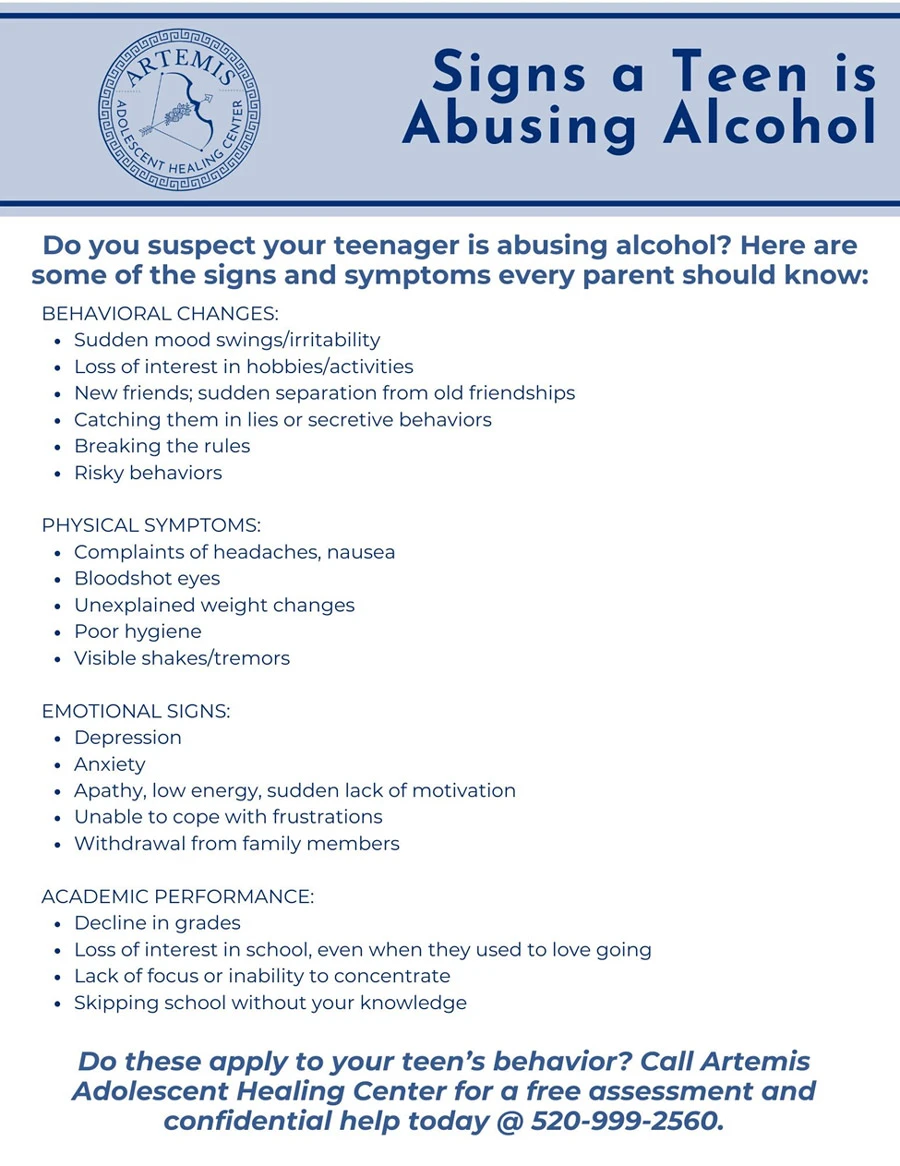Can Young People Benefit from AA for Teens and Adolescents?
You might wonder whether there are rules and restrictions when considering Alcoholics Anonymous for teens. The AA book does not mention any specific age restrictions, so teens can presumably attend AA meetings without experiencing any issues. However, the traditional AA meetings were designed in the mid-1930s with adults in mind. Allowing teens to attend is allowed. However, the more pressing question might be whether youth will feel comfortable or relate to 12-step support groups.
Catalina Behavioral Health in Tucson, Arizona, introduces the Artemis Adolescent Healing Center, a safe environment where teens can wholly and actively participate in addiction and mental health treatment programs. Our residential and outpatient treatment center provides professional support for young people facing tough challenges, including substance use disorders and behavioral health challenges.
We encourage you to keep reading to learn more about adolescent addiction treatment and how our substance abuse treatment center can turn things around for your child.
Get Accredited Treatment for Teens with Catalina and Artemis
The Pros and Cons of Substance Abuse Support Groups for Minors
If school counselors or educators have advised you that your teen should attend meetings, you might have an uneasy feeling. You may know that your teenager has addictive behaviors to resolve but question the idea of letting them join an alcohol addiction group instead of attending individual family therapy sessions.
There’s no single, clear-cut answer, and each teen has unique needs that require unique strategies. Here are some pros and cons of letting youth participate in AA:
Pros of AA for the Teen Age Group

Available in person or as virtual meetings, the AA recovery program is easy to join. Here are some ways AA might provide the right support for a teen’s drinking problem:
Positive Changes Can Come from Peer Support
Teens struggling with alcohol addiction or drug abuse in any form may feel very isolated and lonely. While this peer group may be older, they share similar struggles within the group.
Sharing with non-judgmental group members can reduce isolation and create a safe space to be heard. They receive validation of their feelings, making it easier to get sober, as well as setting a better foundation for family therapy and healing.
Accountability to Avoid Further Alcohol Abuse
AA encourages abstinence from drinking. The weekly structure brings accountability and recommitment to sobriety every week. Members talk about overcoming challenges and learn alternatives to drinking to help them choose sobriety.
Knowing that participation is expected (but not required), they start looking forward to sharing progress reports as well as concerns. The recovery group keeps motivation high.
AA Provides a Safe Environment for Members Experiencing Addiction
Teens or adults in AA have found a non-judgmental place to discuss their struggles. Whether they have challenges with work, school, family dynamics, or other issues to discuss, nobody at AA will criticize them for feeling a certain way.
They can express their emotions and receive encouragement from AA members who have experienced similar problems.
Cons of Alcoholics Anonymous for Teens and Youth

Many parents have concerns about AA and might prefer teen-specific support groups. Here are some misconceptions that may steer away from AA meetings, but that can be addressed appropriately:
AA Meetings Don’t Provide Sufficient Support
AA is not intensive enough an intervention for some. Reuters reported about a study published in the journal Alcoholism: Clinical & Experimental Research. The study measured the sobriety of teens who attended inpatient treatment for alcohol use followed by AA groups 1 to 2 times per week.
The teens who completed the residential care and attended AA did better than both other groups, who had attended AA without professional help or attended residential treatment but skipped AA. Across all three groups, the researchers found that the main thing motivating alcohol use was other teenagers – classic peer pressure.
Youth Might not Stay Engaged in AA Meetings
AA has an older vibe that may not keep teens engaged during meetings. The AA Big Book is full of terms that today’s young people consider triggering. Words like “lush,” or “alcoholics,” once the norm, are now considered dehumanizing or stigmatizing. Teens may not relate well to the program, or its focus on a Higher Power and will avoid AA meetings, despite the good fellowship.
In this case, we also support SMART Recovery meetings for teens attending treatment at Catalina, to provide an alternative and complement to the Anonymous approach that appeals to a younger, often more secular, audience.
Teens Might Feel Out of Touch with the Adults
While some teens want to participate in meetings of some sort, AA can feel like an ‘older crowd.’ If they want to focus on finding sober new friends, they will soon see that the members are primarily adults in a different age group. They’ll appreciate the valuable resources of AA but become discouraged about making friends pretty quickly.
This can be addressed through attending meetings that are purposely designated for beginners or young people, with several selections below.
The Substance Abuse and Mental Health Services Administration: Guidance on Seeking Help for Troubled Teens

SAMHSA advises parents or caregivers to reach out to get help for teens with a drinking problem. They mention how drinking can impact not only the teen but their entire families, including parents and other family members.
The National Institute on Drug Abuse (NIDA) agrees and warns that without prevention, teens run the very real risks of leaving educational programs, losing contact with positive friends or family members, impaired memory, getting infectious diseases, overdosing, or death.
AA Meetings in Tucson
You can search online for Tucson AA meetings using their meeting finder tool. Look for “newcomer” or “beginner” meetings at a convenient time. Here are a few examples:
- M/T/W/Th/F 6 pm | Weeknight Newcomers Group | 3120 W. Curtis Rd., Tucson
- Tuesday, 7 pm | Smoke Free Group | 3620 N. 1st Avenue, #148, Tucson
- Saturday, 3 pm | ECKG Group | 3120 W. Curtis Rd., Tucson
These groups focus on the basics of recovery, offering better addiction support for young adults or teens struggling with substance use disorders.
Note that Al-Anon is open to teens, but it’s an option to provide support for young people whose family or friends struggle with addiction. Al-Anon support groups teach them how to navigate their unhealthy family dynamics or relationships; the meetings don’t provide direct addiction support or programs.
SMART Recovery Meetings

As touched on above, SMART Recovery may be more engaging for teens or young adults. Instead of a talking format, which teens may find dull, participants engage in hands-on exercises and share with the group to receive positive feedback. Like, AA, SMART is evidence-based. Unlike AA, it will benefit people with all unwanted behaviors.
They welcome every person. Whether the issue is tobacco use, drinking, using drugs, overeating, or other obsessive behaviors, SMART can help.
Up To 100% of Rehab Costs Covered By Insurance
Find Effective, Safe Recovery Support for Young People at Artemis Today
Our treatment programs, including residential inpatient rehab as well as our IOP for teens, help keep adolescents and young adults safe by providing around-the-clock care and monitoring their physical and emotional well-being every moment they’re in our care. Our recovery programs include individual therapy with specialists in adolescent psychology and support groups to make them feel like part of a community.
If your teen needs professional help, our recovery programs can help.
Call us today for information about our programs or teen and young adults – it’s always confidential, so please reach out now to get options to support your child in achieving their dreams with renewed purpose.





